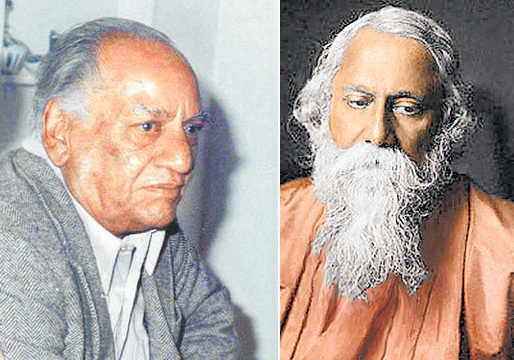
Faiz (left) and Tagore protested both British colonialism and parochial forms of nationalism
Priya Satia
AS India and Pakistan begin celebrating the 70th anniversary of their Independence as nation-states, it is worthwhile recalling the internationalist ideas that also exercised great influence in that moment. In 1947, as the subcontinent broke free from British rule, millions also coped with the violence and confusion of the mass migration we know as Partition. Indeed, all over Europe and Asia, the end of World War II produced massive upheaval of borders and displaced populations. Many intellectuals and writers observing this crisis in the nation-state system saw the war as a titanic struggle between internationalist communism and fascist nationalism in which communism had prevailed. As Partition created two new nation-states just then, South Asian writers struggled like others to understand its meaning and impact. Certainly, many were deeply committed to the idea of Pakistan, and others to the idea of India. But what of those committed to internationalism? From the 1920s to the 1940s, many South Asian writers, from Rabindranath Tagore to Faiz Ahmed Faiz, protested both British colonialism and parochial forms of nationalism, whose calamitous effects the world wars made dramatically clear. Faiz preferred the internationalist and egalitarian outlook of communism. Allama Iqbal hoped Islam might offer a way to move beyond nationalism. The creation of two separate nation-states in 1947 was a painful disruption to such efforts to think outside the box of nationalism in South Asia. Still, many hoped it might prove only a temporary disruption as they continued to pursue more utopian goals. Faiz's famous poem on Partition ended by admonishing, “Chale chalo ki woh manzil abhi nahin aayi.” In India, Ali Sardar Jafri said, “Ab bhi zindan-e-ghulami se nikal sakte hain, Apni taqdir ko hum aap badal sakte hain.”
These hopes were not unreasonable in that moment. After 1947, India struggled to crush communist peasant rebellion in Hyderabad; communist revolution came to China in 1949. The Pakistani and Indian governments were both worried enough about the Leftist threat that they jailed internationalist writer-activists: in 1951, Faiz was behind bars in Pakistan, and his friend, the poet Makhdoom Mohiuddin, a leader of the rebellion in Hyderabad, was behind bars in India.
Continuing aspiration towards a more radical utopia helped such thinkers both deny and cope with the trauma of Partition. Their own writing and mutual friendships across the border also allowed them to genuinely transcend it. As oral histories collected by the Berkeley-based Partition Archive confirm, movements back-and-forth across the border were possible and common before 1965; many who moved assumed they would return. The range of possible relationships between India and Pakistan narrowed later.
In the meantime, rather than simply conforming to new national identities as “Indians” or “Pakistanis,” many writers expressed the widespread experience of split identity, the divided selfhoods of exiles, refugees, orphans, converts, and abductees whose only truth was unresolved confusion. As Nasir Kazmi put it, “Phool khusbhoo se judaa hain ab ke, Yaaron ye kaisi hava hai ab ke.” Minority communities — including Parsees, Jews, and Christians — likewise struggled to find belonging. If Urdu flourished in Pakistan, away from its roots in Delhi, the Deccan, and UP, writers like Laxman Bhatia gave Sindhi literature some life in India. On both sides, people lived among the detritus of Partition.
For those committed to internationalism, the bloody making of the border presented a torturing set of options. Their position recalls the image of a deranged Bishan Singh opting to die in the no man's land between the two new countries in Saadat Hasan Manto's 1955 story Toba Tek Singh. It recalls also a couplet by Nida Fazli, whose father left Gwalior for Pakistan in the 1960s: “Kabhi kissiko mukammal jahaan nahi milta, kahin zameen to kahin aasmaan nahin milta.”
Partition also turned people into writers-for instance, Khushwant Singh and Bapsi Sidhwa. The tragedies and absurdities it entailed were ideal subjects for prose fiction, film, and theatre; the event became a prolific source of fictional stories even as we have delayed gathering the true stories of people who lived through it. Partition also possessed an inherent poetic appeal, resonating with “birha,” a core theme of northern South Asian poetry which uses the tension of romantic separation as an allegory for spiritual devotion. Partition was supposed to be about virtuously abandoning a heathen land (hijrat), but many poets nevertheless depicted it as separation from a beloved (hijr).
When we tell the story of Partition through writers' experiences, it becomes a very different event from the one we know through the high-political narratives focused on Jinnah, Nehru, and the Mountbattens. Writers' ideas and lives destabilise comfortable nationalist certainties. They testify to an ambivalence that was much more widespread, especially through the 1950s. Recovering that ambivalence may allow us to imagine more ambivalent futures too, in which borderlines may not only divide but bridge. We too might begin to think outside the box of nationalism.
The writer is an Associate Professor, Department of History, Stanford University



























